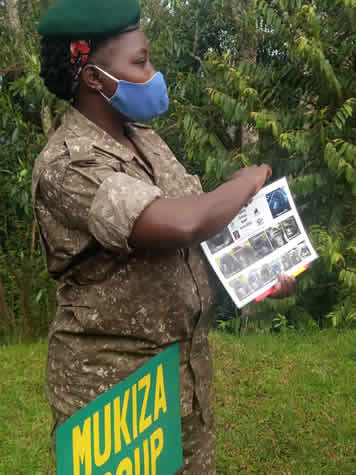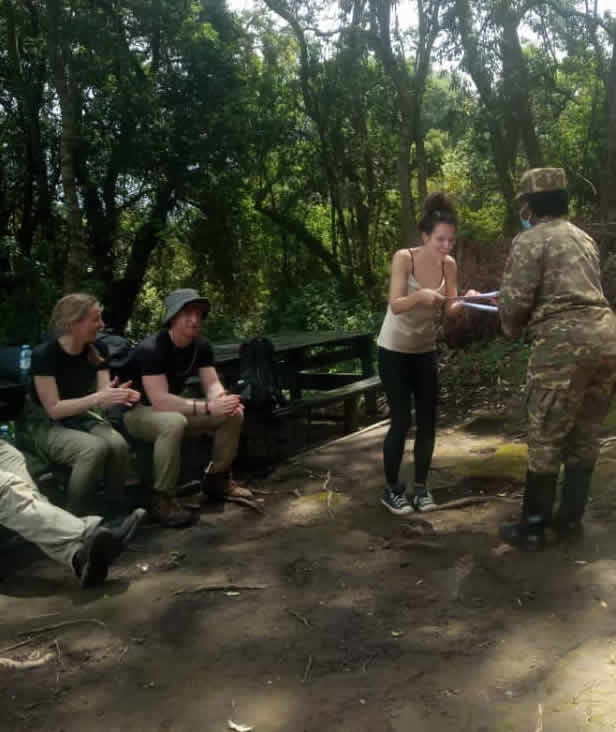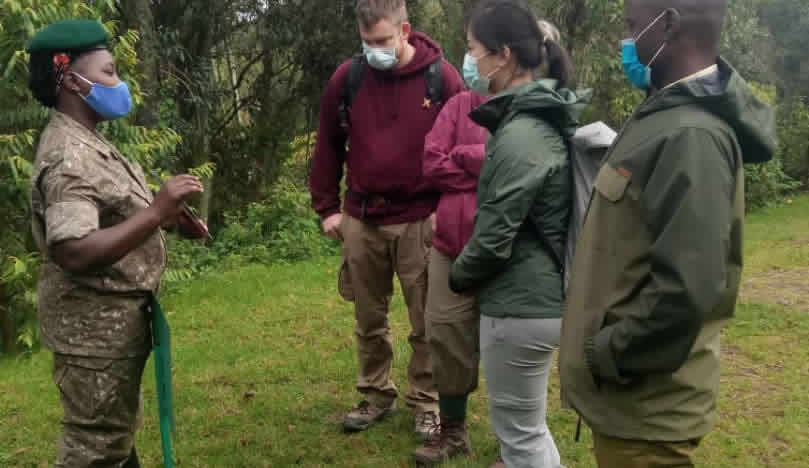Gorilla trekking in Rwanda and Uganda has become one of the world’s most unique and coveted wildlife experiences, drawing tourists from across the globe to venture into the dense, mist-laden forests of East Africa. This burgeoning form of eco-tourism centers around trekking in search of the critically endangered mountain gorillas that inhabit these regions, providing a rare opportunity to observe these majestic animals in their natural habitat.
Rwanda’s Volcanoes National Park and Uganda’s Bwindi Impenetrable National Park serve as the primary sites for gorilla trekking, with both nations investing in infrastructure, training, and conservation measures to support and protect these extraordinary ecosystems. This form of tourism has become vital to the economies of both countries, generating substantial revenue from high-priced trekking permits and fostering a range of businesses and services surrounding the gorilla trekking experience.

Beyond its economic benefits, gorilla trekking has also been transformative for local communities, particularly for women. Traditionally, the workforce involved in trekking and conservation in these rural areas was dominated by men, but as tourism has grown, so has the inclusion of women in key roles. Today, female guides, rangers, and entrepreneurs are breaking gender barriers and reshaping the industry, contributing to the protection of gorillas while achieving unprecedented economic independence and social empowerment.
This article delves into how gorilla trekking impacts women in Rwanda and Uganda. It explores how their contributions enhance conservation, uplift communities, and foster a more inclusive and equitable future in eco-tourism. Through a blend of economic support, role diversification, and leadership opportunities, gorilla trekking is proving to be an extraordinary catalyst for women’s empowerment in East Africa.
How trekking is creating new opportunities for local women
As gorilla trekking grows in prominence, it has opened doors for women across Rwanda and Uganda, offering them new roles and unprecedented opportunities. Traditionally, local women had limited access to formal employment in rural regions, particularly in tourism and wildlife conservation. However, gorilla trekking is reshaping this landscape, providing a powerful pathway to empowerment that impacts individual lives and communities.
Today, women are increasingly visible in the gorilla trekking industry, working as guides, trackers, hospitality staff, conservationists, and community educators. The shift has been driven by government initiatives, local non-profits, and international organizations recognizing the need for gender balance and inclusivity in tourism and conservation. By embracing women’s strengths and skills, these initiatives help create a more inclusive workforce, enrich the visitor experience, and broaden the impact of gorilla trekking on surrounding communities.
Employment in gorilla trekking allows women to gain financial independence, a critical step toward reducing poverty and fostering economic resilience. This economic stability has a ripple effect on families and communities, as women often reinvest their earnings into household needs, education, and local businesses. Financial independence also equips women with the confidence and resources to make decisions within their households and communities, contributing to social progress and uplifting entire villages.
Moreover, the visibility of women in these roles serves as a source of inspiration for younger generations. In communities where opportunities for girls and young women may be limited, seeing female guides and rangers shifts perception, showing that women can thrive in roles once reserved for men. By breaking through traditional gender barriers, women in gorilla trekking are paving the way for a new era of opportunity and empowerment across East Africa.
The Roles Women are Taking on in Gorilla Trekking
As gorilla trekking continues to flourish, women are stepping into various roles. These roles empower women and help redefine traditional gender expectations within their communities.
Park Rangers
One of the most notable roles for women in the gorilla trekking industry is park ranger. Operating within challenging environments like Rwanda’s Volcanoes National Park and Uganda’s Bwindi Impenetrable National Park, female rangers undergo rigorous training to protect gorillas from poachers and ensure the safety of tourists. This role is physically demanding and requires resilience, as rangers spend long hours trekking through challenging terrain. For these women, working as rangers provides a sense of pride and purpose, knowing they are safeguarding both wildlife and their ecosystems.

Tour Guides
Women are also increasingly visible as tour guides, central to the gorilla trekking experience. Female guides lead visitors on treks, share in-depth knowledge about local ecology, and ensure that tourists follow safety protocols that protect the gorillas. Female guides bring unique perspectives, enriching visitors’ experiences with cultural insights and personal stories. For many tourists, these insights create a meaningful connection to the communities and deepen their appreciation for the conservation efforts in place.
Hospitality Professionals
In addition to guiding and ranger roles, many women work in the hospitality sector, which supports the gorilla trekking industry. From managing eco-lodges to preparing meals and maintaining guest facilities, women contribute significantly to the visitor experience. These hospitality roles offer stable, rewarding employment, often allowing women to support their families in ways that would not have been possible through traditional subsistence farming.
Artisans for Crafts and Souvenirs
Many women in communities around gorilla trekking areas also produce handicrafts and souvenirs for tourists. These crafts, ranging from woven baskets to jewellery and clothing, reflect the cultural heritage of Rwanda and Uganda. Selling their creations provides an income source for women, who can leverage traditional craftsmanship to benefit their families and the local economy.
Community Educators
Many women take on roles as community educators, focusing on wildlife conservation and environmental stewardship. These women visit schools and community gatherings to learn the importance of protecting gorillas and maintaining ecological balance. By fostering a conservation mindset among children and community members, they ensure continued support for gorilla protection and empower others to appreciate the region’s natural heritage.
Impact of Women’s Involvement
The economic benefits of gorilla trekking in Rwanda and Uganda extend well beyond the revenue generated from tourism. For the women involved in this industry, these benefits are transformative, offering employment and the opportunity for financial independence and stability. This economic empowerment has profound implications for women, their families, and the communities they support.
Breaking Cycles of Poverty with Steady Employment
For women in rural areas, economic opportunities have traditionally been limited to subsistence farming or informal work, offering minimal financial stability. With the rise of gorilla trekking, however, women now have access to formal employment with steady incomes that are often significantly higher than in other sectors. This income provides the stability women need to support their families, invest in their children’s education, and improve their quality of life, breaking cycles of poverty that have persisted for generations.
Community Uplift
Beyond benefiting individual households, women’s financial independence has a ripple effect that extends throughout entire communities. Research shows that women reinvest a significant portion of their earnings into their families and local economies. Many women in gorilla trekking use their incomes to support local schools, health clinics, and other communal services, fostering a more resilient social structure. This reinvestment promotes a growth cycle where tourism benefits individual families and strengthens the community.
Inspiring Leadership and Shifting Cultural Norms
Financial independence also empowers women to become community role models and leaders. Women who succeed in the gorilla trekking industry inspire others to pursue similar paths, advocating for broader economic participation among women. This increased visibility helps break down stereotypes and shift cultural norms, gradually fostering a more inclusive and supportive society that embraces women in various roles beyond traditional expectations.
Promoting Personal and Professional Growth
The financial empowerment from working in gorilla trekking equips women with resources to pursue further personal and professional development. Many women use their income to continue their education, gain new skills, or even start small businesses. This diversification creates additional revenue streams, fosters entrepreneurial growth in rural areas, and further expands the economic impact of gorilla trekking beyond the immediate industry.
Challenges and Barriers Women Face in the Gorilla Trekking Sector
While gorilla trekking offers numerous opportunities, women face distinct challenges and barriers in entering and thriving within the industry. These obstacles range from cultural norms and social expectations to logistical and physical challenges, all impacting women’s ability to participate fully. Despite these barriers, women continue to demonstrate resilience and determination, gradually overcoming these hurdles through personal and community-driven efforts.
Cultural and Gender Norms
In many rural communities in Rwanda and Uganda, traditional gender roles have historically limited women’s career options. Women are often expected to focus on domestic responsibilities, such as caring for children and managing households, leaving little room for outside employment. Cultural expectations may create additional pressure for those considering roles in gorilla trekking, such as rangers or guides, as these roles are sometimes seen as male-dominated or unsuitable for women. As a result, women entering the industry can face scepticism or resistance from family members and community elders, discouraging them from pursuing these roles.
Physical Demands and Safety Concerns
Gorilla trekking often requires navigating rugged terrain in remote forested areas, which presents physical demands that can be daunting. For women in roles as rangers, guides, or trackers, these physical requirements are compounded by the need for extensive training and the ability to handle potential encounters with wildlife or poachers. Safety can also be a concern, particularly in regions where women may be more vulnerable while working alone in isolated environments. Despite these challenges, many women in the sector undergo rigorous training to build physical endurance and resilience, proving they are just as capable as their male counterparts.
Access to Education and Training
In rural East Africa, access to formal education and training can be limited, which poses a challenge for women aspiring to work in specialised roles within gorilla trekking. Educational barriers limit knowledge of conservation practices and eco-tourism and restrict women’s ability to develop necessary skills, such as language proficiency or understanding of wildlife biology, which are valuable in guiding or educating tourists. However, various non-profits and government programs have recognised this gap, implementing training initiatives to provide women with essential skills and resources to succeed.
Limited Financial Resources and Economic Dependence
For many women, financial limitations are a significant barrier to entering the gorilla trekking industry. The costs associated with training, equipment, and transportation can be prohibitive, especially for those in remote areas with limited income. Economic dependence on male family members further limits women’s ability to pursue these opportunities. Fortunately, community-driven programs and support from NGOs are helping alleviate some of these financial obstacles, providing scholarships, equipment, and transportation support to enable women’s participation in gorilla trekking.
Balancing Work and Family Responsibilities
For women with families, balancing the demands of a career in gorilla trekking with household responsibilities can be challenging. The long hours and physical demands of working as a ranger or guide mean that women often need to arrange additional childcare or household support. This balancing act can be difficult in rural areas with limited extended family networks. Nonetheless, some women have found ways to adapt, relying on community support or working in flexible roles within the tourism sector that allow them to manage work and family life.
Real-Life Women Empowerment Projects in Rwanda and Uganda
Several innovative projects in Rwanda and Uganda showcase the real-world impact of women’s empowerment on conservation, community development, and sustainable livelihoods. These initiatives support women in obtaining financial independence and contribute significantly to gorilla conservation efforts and environmental protection.
Ride 4 A Woman
In Uganda, Ride 4 A Woman operates near Bwindi Impenetrable National Park, aiming to provide women with skills that foster economic independence. Founded in 2009, the program offers vocational training in basket weaving, sewing, baking, and even bicycle repair. The initiative also emphasises social empowerment by creating a community of support and economic stability for local women, helping them sustain their families while reducing pressures on local resources through alternative livelihoods. By empowering women economically, Ride 4 A Woman directly contributes to reducing environmental degradation caused by dependence on forest resources, indirectly benefiting gorilla conservation efforts in the region.
Nyamirambo Women’s Center
In Rwanda’s capital, Kigali, the Nyamirambo Women’s Center (NWC) provides women with vocational training and educational resources, particularly those from marginalised backgrounds. NWC integrates community-based tourism by organising guided tours and cultural experiences, such as cooking classes and weaving workshops. This helps local women generate income while also sharing Rwandan culture with visitors. Through sustainable tourism, NWC addresses gender inequality and supports the local economy, allowing women to become financially independent and fostering a community that values and supports conservation.
Conservation Through Public Health (CTPH)
Dr Gladys Kalema-Zikusoka’s organization, Conservation Through Public Health (CTPH), in Uganda, emphasizes a holistic approach to conservation that includes human health and livelihood support. The CTPH initiative employs local women in various roles intersecting conservation and public health, such as community health workers educating families about zoonotic disease prevention and sustainable living. The organization also launched Gorilla Conservation Coffee, which trains women farmers and provides access to global markets, promoting sustainable livelihoods that help reduce poaching and habitat encroachment. This model highlights how integrating public health with conservation can empower women to be central players in protecting their communities and surrounding wildlife.
Women Tour Uganda
Founded by women for women, this tourism company employs a majority female staff, with roles ranging from guides to hospitality experts. Women Tour Uganda creates female-centered travel experiences that include gorilla trekking and visits to local villages and cultural sites. Their mission is to empower women by providing a safe and supportive space within the travel sector, fostering both economic independence and social empowerment



